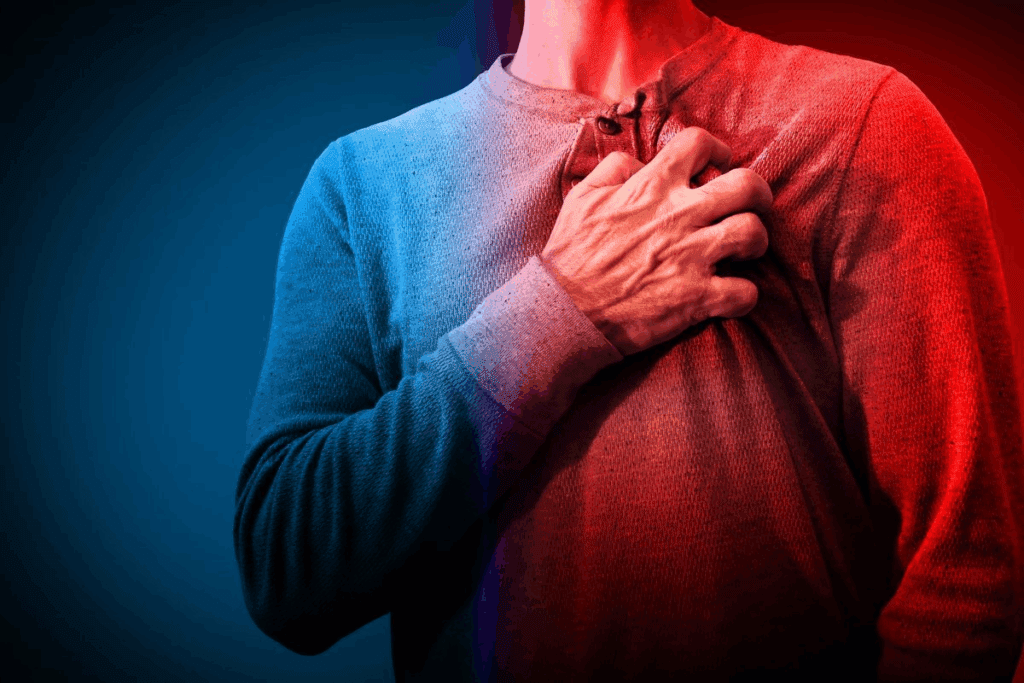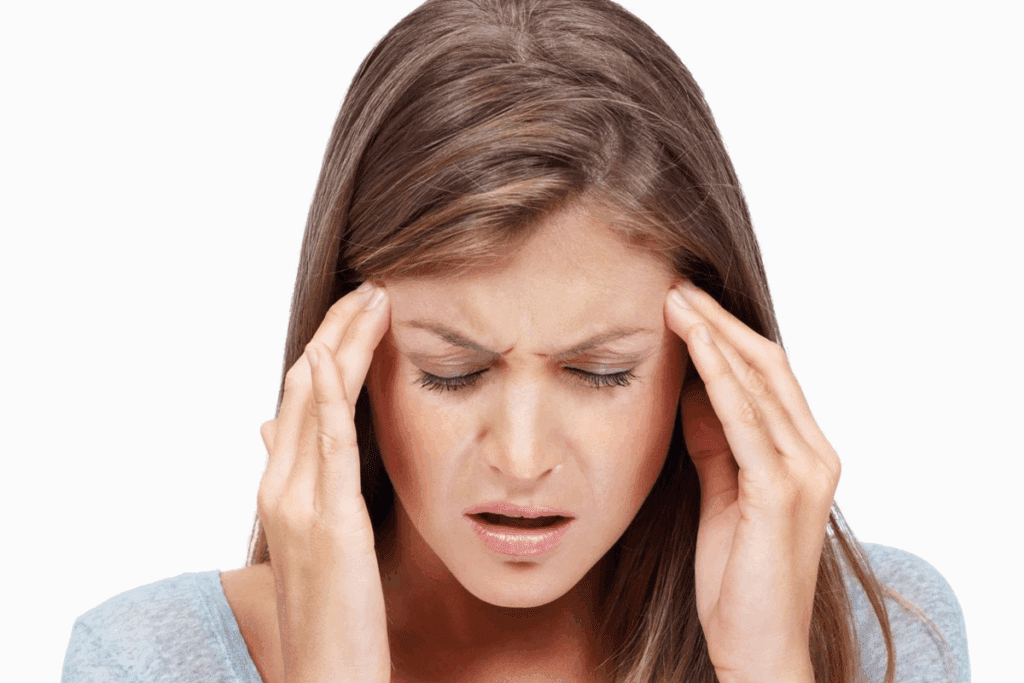Last Updated on November 25, 2025 by Ugurkan Demir

Feeling chest pain when you take a deep breath can be scary. It can really mess up your day. At Liv Hospital, we get how worried you must be. We’re here to help you feel better. Learn what causes chest and muscle pain when breathing deeply and when to seek urgent care.
This pain can come from many things. It might be just a muscle strain. Or it could be something more serious like a heart problem.
When you breathe deeply, the pain might get worse. This could mean you need to see a doctor. We’ll look at what might be causing this pain. We’ll also talk about when you should get help right away.

It’s important to know why chest pain happens when we take deep breaths. We need to understand normal breathing and why deep breathing can cause pain.
Normal breathing uses the lungs, diaphragm, and chest wall together. When we inhale, the diaphragm goes down, and the chest expands. This lets the lungs fill with air easily and without pain.
But, if something goes wrong with these parts, breathing deeply can hurt. This is because any problem can make it hard for the chest to move right.
Deep breathing makes the lungs and chest expand more than usual. This can hurt if there’s a problem, like muscle strain or inflammation. For example, costochondritis, which is inflammation of the cartilage between the ribs and breastbone, can cause a lot of pain when we breathe deeply.
Also, the pleura, a thin membrane around the lungs, can hurt if it’s inflamed (pleurisy). Deep breathing can make this pain worse. Knowing how these things work helps us understand why chest pain happens when we breathe deeply and what might be causing it.

Chest pain when we breathe deeply is common. It often comes from specific causes. When we take deep breaths, our chest expands. This can stretch or move structures inside, causing pain if there’s an injury or condition.
Muscle strain is a common reason for chest pain. It happens to people who do a lot of physical activity or have jobs that involve heavy lifting. Strained chest muscles can hurt more when we breathe deeply or move.
Symptoms of muscle strain include sharp pains or tenderness in the chest area. Rest and proper care can help ease these symptoms.
Costochondritis is inflammation of the cartilage that connects the ribs to the breastbone. It can cause sharp pains or aching in the chest, similar to a heart attack. Deep breathing, coughing, or moving can make the pain worse.
It’s important to get medical evaluation to tell costochondritis apart from serious heart problems.
The intercostal muscles are between the ribs and help expand and contract the chest during breathing. Injuries to these muscles can cause chest pain when breathing deeply. The pain from intercostal muscle injuries can be sharp and is often localized to the area of injury.
Treatment usually involves rest, pain management, and physical therapy to strengthen the muscles around the injury.
Knowing the common causes of chest pain when breathing deeply can help us find the source of discomfort. Some causes might be harmless, but others need medical attention to avoid complications or treat underlying conditions.
Deep breathing can trigger chest pain in many respiratory conditions. This pain often signals a serious issue that needs medical help. Conditions like pleurisy, pneumonia, and pulmonary embolism can cause this pain, impacting our health.
Pleurisy is when the pleura, the lung’s lining, gets inflamed. This can lead to sharp chest pain that gets worse with deep breaths or coughing.
Pneumonia is an infection that inflames the lungs’ air sacs, sometimes filling them with fluid. This can make breathing deeply painful.
A pulmonary embolism happens when a blood clot blocks a lung blood vessel. This can cause chest pain that gets worse with deep breaths.
Knowing about these respiratory issues is key to managing chest pain from deep breathing. If you have ongoing or severe chest pain, get medical help right away. They can find the cause and start the right treatment.
Chest pain during deep breathing can be scary, often linked to heart issues like pericarditis or angina. These heart problems need quick medical help.
Pericarditis is when the sac around the heart gets inflamed. It causes sharp chest pain, worse when breathing deeply. Sitting upright helps ease the pain.
Pericarditis symptoms include sharp chest pain that might spread to the neck, shoulders, or back. Lying down or deep breathing makes it worse.
Angina is chest pain from not enough blood flow to the heart. It feels like pressure or squeezing. Pain can spread to the arms, back, neck, jaw, or stomach.
A heart attack happens when heart blood flow is blocked, damaging heart muscle. Symptoms include chest pain, feeling weak, or light-headed. Pain can also be in the jaw, neck, or back, and arms or shoulders.
Heart pain when inhaling is a serious sign. Chest pain during deep breathing can mean heart issues like pericarditis, angina, or heart attack. If you feel this pain, get medical help fast to find out why.
Chest tightness when deep breathing can come from many health issues. These include anxiety, respiratory problems, and digestive diseases. We’ll look at anxiety, asthma, COPD, and GERD to understand their symptoms and treatments.
Anxiety and panic attacks often cause chest tightness. The body’s “fight or flight” response is triggered, leading to rapid breathing and tension in the chest. This can make the chest feel tight or pressured.
Symptoms of anxiety-induced chest tightness include:
Asthma and COPD can also cause chest tightness. Asthma leads to inflammation and airway constriction, causing wheezing and difficulty breathing. COPD obstructs airflow, making breathing hard.
| Condition | Symptoms | Treatment |
| Asthma | Wheezing, coughing, shortness of breath | Inhalers, avoiding triggers |
| COPD | Shortness of breath, wheezing, chronic cough | Medications, pulmonary rehabilitation |
GERD causes stomach acid to flow back into the esophagus, irritating it. This can lead to chest tightness or pain, often when lying down or after eating.
Common GERD symptoms include:
Knowing these causes can help manage chest tightness. If symptoms persist or worsen, see a healthcare professional for a diagnosis and treatment plan.
Chest pain that gets worse when lying down is a serious symptom. It can be caused by many factors, both positional and medical. Understanding these causes and how to manage them is key.
Certain positions, like lying down, can make chest pain worse. This is often due to increased pressure on the chest. For example, costochondritis is an inflammation of the cartilage connecting the ribs to the breastbone. When lying down, this pressure can irritate the inflamed areas, causing pain.
Gravity also plays a role when lying down. For instance, acid reflux can cause stomach contents to flow up into the esophagus. This can lead to discomfort felt as chest pain.
Several medical conditions can make chest pain worse when lying down. Pericarditis, an inflammation of the heart’s sac, is one. The pain from pericarditis can get better when sitting up but worsens when lying down.
Other conditions, like heart failure, can also cause pain that gets worse when lying down. In heart failure, fluid in the lungs can cause discomfort that’s worse when lying down.
| Condition | Symptoms | Effect of Lying Down |
| Costochondritis | Chest pain, tenderness | Pain worsens |
| Pericarditis | Sharp chest pain | Pain worsens |
| Heart Failure | Shortness of breath, fatigue | Discomfort increases |
Managing chest pain at night involves lifestyle changes and, if needed, medical treatment. Elevating the head of the bed can help with acid reflux symptoms. For conditions like pericarditis or costochondritis, over-the-counter pain relievers might be suggested.
“Understanding the cause of your chest pain is key to managing it. If your chest pain gets worse at night, seek medical help.”
Medical Expert
Keeping a symptom diary is helpful. It tracks when pain occurs and what triggers or relieves it. This information is valuable for diagnosing and treating chest pain.
Chest pain can feel different, and knowing these differences is key to figuring out what’s wrong. We look at several important factors to find the cause of chest pain.
Where and how pain spreads in the chest is very telling. Pain stuck in one spot might mean something different than pain that moves around.
Pain in the chest’s center often points to heart problems. Pain that spreads to the arm or jaw also suggests heart issues. But pain that stays on one side or gets worse with movement might be from muscles or bones.
| Location/Radiation | Possible Causes |
| Center of chest | Cardiac issues |
| Radiates to arm or jaw | Cardiac-related |
| Localized to side | Musculoskeletal issues |
The way chest pain feels and how bad it is also tells us a lot. Pain can be sharp, dull, squeezing, or burning, and can range from mild to very severe.
Sharp pain that gets worse with movement or deep breaths might be from muscles or lungs. Dull, squeezing, or heavy pain often means heart trouble.
We also watch for other symptoms that come with chest pain. These help us figure out what’s causing it.
These symptoms give us clues about chest pain’s cause. They help us decide what tests and treatments are needed.
Knowing when chest pain is serious can be a matter of life and death. Chest pain is a symptom that can cause significant concern. It’s important to know when to seek medical help.
Certain symptoms with chest pain are red flags. They show a potentially life-threatening condition. These include:
If you or someone else is experiencing these symptoms, seek immediate medical attention.
Deciding when to go to the emergency room (ER) for chest pain can be tough. If you’re experiencing red flag symptoms, go to the ER right away. Also, if you’re unsure about your chest pain or it’s with other concerning symptoms, it’s best to seek medical evaluation.
Differentiating between serious and non-serious causes of chest pain is complex. It requires medical expertise. While some causes, like muscle strain or costochondritis, are not life-threatening, others, like a heart attack or pulmonary embolism, need immediate treatment. We will help you understand the various causes and their implications.
It’s important to talk to a healthcare professional about your chest pain. They will assess your symptoms, medical history, and perform tests. This will help them provide a diagnosis and recommend the best treatment.
Dealing with chest pain when you breathe deeply starts with finding the cause. Once you know what’s causing it, you can create a treatment plan just for you.
Medical treatments for chest pain vary based on the cause. For example, if it’s due to a lung issue like pleurisy or pneumonia, you might get antibiotics or anti-inflammatory medications. If it’s heart-related, like pericarditis, you might need anti-inflammatory drugs and sometimes hospital care.
For issues like costochondritis or muscle strain, you’ll likely get pain relief medications and rest. Sometimes, physical therapy is suggested to help move better and feel less pain.
Advil, or ibuprofen, can ease chest pain from inflammation or muscle strain. It cuts down on inflammation and eases pain. But, always talk to a doctor before taking Advil for chest pain, as it’s not right for all types, like heart issues.
Advil can help with pain and swelling from costochondritis. But, if your chest pain is from something serious like a heart attack or lung blockage, you need to see a doctor right away.
There are also home remedies and self-care tips to help with chest pain. These include:
Using medical treatments along with these home remedies and self-care tips can help manage chest pain. This way, you can improve your life quality.
Recovering from chest pain when breathing deeply is complex. It involves medical treatment and lifestyle changes. We know how important it is to manage chest pain effectively.
The time it takes to recover from chest pain varies. If the pain is from a muscle issue or costochondritis, recovery can take a few weeks. Treatment includes rest, physical therapy, and anti-inflammatory drugs.
But, if the pain is from pleurisy or pneumonia, recovery takes longer. You’ll need antibiotics and more time to get better. Always follow your doctor’s treatment plan for a smooth recovery.
| Condition | Typical Recovery Time | Common Treatments |
| Muscle Strain | 1-4 weeks | Rest, Physical Therapy, NSAIDs |
| Costochondritis | Several weeks to months | Anti-inflammatory medications, Heat or Cold Therapy |
| Pleurisy/Pneumonia | Varies; often longer than muscular issues | Antibiotics, Rest, Hydration |
Follow-up appointments are key to recovery. They let doctors check your progress and adjust treatment if needed. They also help address any new issues.
At these visits, talk about your symptoms and any changes. Share any side effects from treatments. This helps tailor your care to your needs.
To prevent chest pain from coming back, make lifestyle changes. Stick to your treatment plan and, if needed, take preventive medicines. For costochondritis, regular stretching and avoiding heavy lifting can help.
For respiratory-related chest pain, quitting smoking and getting vaccinated are important. Stay up-to-date on flu and pneumococcal vaccines.
Key Strategies for Preventing Recurrence:
Understanding recovery and taking proactive steps can reduce chest pain recurrence. This improves your quality of life.
It’s vital to understand and manage chest pain for good heart health. We’ve looked at many reasons for chest pain when breathing deeply. These include lung problems, heart issues, and other possible causes.
Knowing the signs and what’s behind them helps people get the right help. We talked about how to tell different kinds of chest pain apart. We also stressed the need to watch for serious signs and know when to get help fast.
Handling chest pain means using medicine, changing your lifestyle, and taking care of yourself. It’s important to keep up with follow-up care and watch for signs of it coming back. This helps you recover well.
Knowing about chest pain is the first step to dealing with it. Being informed and taking action helps you control your health. If you have ongoing or severe chest pain, always talk to a doctor.
Chest pain when you breathe deeply can have many causes. These include muscle strain, pleurisy, pericarditis, and heart issues. We’ll look into these to find out why you’re feeling pain.
Muscle strain and costochondritis are common causes. So are intercostal muscle injuries, pleurisy, and pneumonia. Pulmonary embolism, pericarditis, angina, and heart attack can also cause it. Knowing the cause is key to getting the right treatment.
Advil (ibuprofen) can ease pain from inflammation or muscle strain. But, always talk to a doctor before taking it. This is true if you’re not sure why your chest hurts.
Go to the ER for severe chest pain, trouble breathing, or dizziness. If you’re not sure, it’s safer to see a doctor.
Serious chest pain is intense and comes with shortness of breath or dizziness. Less serious pain might be from muscle strain. A doctor can tell you which it is.
Treatment depends on the cause. It might include medicine, home remedies, or self-care. Your doctor will decide the best treatment for you.
To avoid future pain, understand and manage its cause. This might mean staying healthy, exercising, and managing stress.
Recovery time varies based on the cause and treatment. Your doctor will guide you on what to expect.
Lying down can make chest pain worse due to position or medical issues. Knowing why your pain gets worse at night is important for managing it.
Yes, anxiety and panic attacks can lead to chest tightness. Relaxation techniques and professional help can help ease these symptoms.
Subscribe to our e-newsletter to stay informed about the latest innovations in the world of health and exclusive offers!